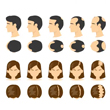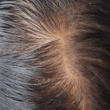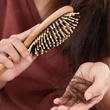How to Handle Hair Loss from Cancer?
Introduction 1,2

Cancer treatment can take a toll on your body. The most common side effect of cancer treatment is hair fall, and this can occur with treatments like chemotherapy, radiotherapy, targeted therapy, and even stem cell transplants. Though cancer hair loss is common in patients, not everyone loses their hair. Also, no two people undergoing the same treatment experience similar hair loss. However, studies show that nearly 65% of people undergoing chemotherapy for cancer suffer from chemotherapy-induced hair loss.
Cancer hair loss is usually temporary and can affect the hair all over your body– including your head, arms, legs, pubic area, armpits, and even your face. While some people may experience hair loss in small sections, others might wake up to find a chunk of hair on their pillowcases in the morning. While the cancer treatment can be challenging, experiencing hair loss can affect one physically as well as emotionally.
Managing cancer hair loss is an important part of your cancer support care and here is more about how to handle it!
What Causes Hair Loss in Cancer Patients? 1,3,4
Cancer and its treatments take a toll on the body– emotionally, mentally, physically, and psychologically. The hair loss that accompanies cancer doesn't help to boost morale either. Many reasons cause hair loss in cancer patients:
• Chemotherapy
Though chemotherapy-induced hair loss is commonly heard of during cancer treatment, not all chemotherapy drugs are to blame. Some chemotherapeutic drugs that are known to cause hair thinning or hair loss include altretamine, carboplatin, cisplatin, cyclophosphamide, vincristine, and a few others. Hair loss due to chemotherapy does not usually occur immediately after starting treatment, but instead, it can take a few days to a few weeks to occur. Also, hair loss depends on many factors, like the drug used and its dosage. Hair grows back once chemotherapy ends, but it may take a couple of months to grow back completely.
• Radiation therapy
Unlike chemotherapy-induced hair loss, which occurs all over the body, hair loss due to radiation therapy occurs only in the region where the radiation is given. The hair usually grows back after treatment completion, but it is normal for it to become thin or change its texture. In some cases where very high doses of radiation are given, hair might not regrow.
• Hormonal therapy
Hormonal therapy usually does not cause hair loss but may result in hair thinning a few weeks to months after beginning treatment. Some hormonal therapies that are known to cause hair loss include tamoxifen, letrozole, anastrozole, and fulvestrant.
• Targeted therapy
Just like hormonal therapy, targeted therapy does not cause complete hair loss but may result in hair thinning. However, targeted therapy with the drugs like afatinib, cetuximab, nilotinib, imatinib, etc., may cause your hair to become thinner, drier and sometimes, curlier than usual.
How to Cope with Cancer-Related Hair Loss? 1,2,5
The diagnosis of cancer tends to create panic in a majority of people. Though a wide range of treatments is available today, different types of cancer-related treatments can cause varying amounts of hair loss. Whether hair loss is mild or severe, it sure can be traumatic.
One of the most common measures used to reduce cancer hair loss is the use of cold caps. Cold caps are worn on the scalp during a chemotherapy session to reduce hair loss. The cold temperature of the cap reduces the width of the blood vessels in your scalp, reducing blood flow and subsequently reducing the flow of the drug to your follicles.
Here are some ways to cope with cancer hair loss:
• Accept and give yourself time
Hair loss during cancer treatment is a widely known fact, and the best way to manage it is to accept it before you begin your treatment. Yes, it may be difficult to accept initially, and it may take some time to adjust to your new look. Accept your feelings and give yourself some time to settle into this change. Also, know that your hair loss is temporary, and it will regrow after your treatment is complete.
• Hair loss does not mean you are different
Your body and mind are undergoing major changes during your cancer treatment. With so many changes, you might feel different both physically and emotionally. It may be challenging to see yourself with little or no hair, and the continuous hair fall may come as a shock too. However, remember one thing– you are still you! Hair loss or your appearance does not mean you are different. It is just a matter of some time, and you should focus on the inner you rather than the outer you until the end of your treatment.
• Prepare yourself for hair loss
Since hair loss is an expected side effect of cancer treatments, it may be a good idea to prepare in advance for it. Speak to your doctor and counselor about it. Take this as an opportunity to experiment with a new look and speak to your stylist accordingly. Whether you wish to opt for a wig or head coverings, take your time and pick what is most comfortable for you!
• Consider head covering options
Since hair loss is an expected side effect of cancer treatments, it may be a good idea to prepare in advance for it. Speak to your doctor and counselor about it. Take this as an opportunity to experiment with a new look and speak to your stylist accordingly. Whether you wish to opt for a wig or head coverings, take your time and pick what is most comfortable for you!

There are many head covering options that you can explore– from turbans, caps, scarves to head wraps– the world is your oyster! Find a specialty shop that can help you with your new look during your cancer treatment to help you manage your hair loss. Your insurance and other special assistance programs can help you cover these expenditures.
• Reduce the length of your hair before the treatment
If you have always had long hair, it may be a good idea to cut them short before beginning your cancer treatment. This reduces the pain and distress when your hair begins to fall out. Having short hair also gives you a sense of control and makes it easy to shave your head, if you are planning to, before beginning your cancer treatment to help reduce itchiness and dryness of the scalp.
• Avoid hair irritants
Using harsh chemicals, heat, or irritants on your hair can damage your hair follicles, causing your hair to fall out. To minimize hair loss during your cancer treatment, it is best to avoid hair colors, perming treatments, electric rollers, iron, etc., on your hair.
Avoid harsh hair care products and choose a mild shampoo and conditioner.
• Follow a healthy lifestyle
Eating a healthy diet, regularly exercising, and keeping yourself hydrated are important during your cancer treatment. Not only does this keep you physically and mentally fit, but it also makes you feel good about yourself.
Talk with your doctor about making healthy lifestyle choices. A dietitian may help develop a nutritious meal plan, and a rehabilitation therapist may help create a personalized exercise plan for you.
• Have a strong support system
Having a strong support team during your cancer journey is absolutely vital. From a counselor to family members and friends, it helps to communicate with them and receive support and comfort. You can also connect with other cancer patients who have experienced hair loss through online support groups and discuss what helped them cope with this issue.
Conclusion 1
If you are concerned and anxious about hair loss during your cancer treatment, speak to your doctor and healthcare team. Apart from the management ways mentioned in this article, your doctor may also prescribe other medications to help in hair regrowth.
Myth Busters HairFall

Androgenetic Alopecia - Everything You Need To Know
Have you been experiencing excessive hair fall over a prolonged period of time? It could be an early sign of androgenetic alopecia. It is a hair loss disorder common in both genders and can lead to progressive thinning and even baldness in some patients if not caught and treated early.

How To Make Hair Grow Faster For Men
A head full of healthy hair is a matter of confidence. Hair has its own mechanism of growing and shedding, and it is when this mechanism is thrown off that growth is hindered. Especially in the case of males, hair growth faces a lot of hiccups that can easily be managed.

Female Pattern Baldness - Causes & Treatments
Have you suddenly noticed an increase in the number of hair strands on your pillow in the morning? Or is your ponytail getting thinner by day? Well, you might be suffering from female pattern baldness. While that does sound scary, identifying it early on is key to treating this condition effectively. So keep reading to know what this is, how you can identify it, and most importantly, what treatments you can avail of to get your beautiful lustrous hair back.

What Are The Reasons For Hairfall?
Almost everyone experiences some amount of hair thinning over the years. Shedding around 50 to 100 single strands of hair per day is considered normal. However, losing more than 150 strands a day, experiencing sudden thinning, or developing circular bald patches on your scalp are reasons for concern. Hair loss occurs when new hair doesn’t grow fast enough to replace the amount of hair you lose daily. Hair can fall due to various reasons, with hereditary hair loss and poor nutrition being the most common hair fall reasons.

Expert Approved Tips For Hair Growth
What can be more debilitating than seeing hundreds of hair strands shedding from your scalp every time you brush your hair? Also, excessive molting occurs during seasonal changes that can be very stressful for you. Although it’s okay to lose between 50-100 strands every day, according to the American Academy of Dermatology, the problem occurs when you start shedding more than normal. But that doesn’t mean you have to feel helpless as there are ways to grow your hair back. Even if you are coping with baldness or alopecia, certain hair growth tips from dermatologists can come to your rescue. Read on to discover how these tips can be your savior when abnormal hair fall problems are in sight.
Trending Videos
+ 5 Sources
'LMRC - GGI-CO-A2-DMA-300001252-300001252-WM-L21-704'
© 2021 Dr. Reddy’s Laboratories Ltd. All rights reserved.